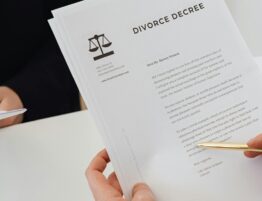In Arizona, a pension earned during the marriage is generally considered a marital asset and is subject to division under the state’s community property laws.
This raises several crucial questions: How is the pension valued? Can it be traded for other assets like a home? And what happens if you’ve been divorced for years—can a former spouse make a claim on your pension? In this blog, we will explore these questions and more, delving into the Arizona Revised Statutes and providing example scenarios to clarify how your pension plan can affect property division in a divorce.
Here’s what this article will cover:
- How Do Community Property Laws Effect Property Division
- Defining a Pension Plan as a Marital Asset
- Can You Roll Pension Into Property?
- The “Coverture Fraction” Method
- Qualified Domestic Relations Orders (QDROs)
- How to Protect Your Pension Interests
- My Wife and I Divorced Years Ago. Can She Still Try to Claim My Pension?
- How We Can Help
Our Phoenix Family Lawyers are Here to Help!
According to a report from the National Institute on Retirement Security, 92% of households with retirement accounts, including pension plans, had balances less than $250,000.

How Do Community Property Laws Effect Property Division
Arizona is one of nine states in the U.S. that follow community property laws, a system derived from Spanish law. These laws are mainly outlined in Arizona Revised Statutes (A.R.S.) § 25-318.
Here are key aspects you should know:
- Equal Division: Community property laws essentially mean that most assets and debts acquired during the marriage are equally owned by both spouses. In a divorce, these are typically split equally between the parties unless there are compelling reasons to do otherwise.
- Separate vs Community Property: Not all property falls under the community property umbrella. Assets owned before the marriage, inheritances, and gifts specifically given to one spouse usually remain separate property and are not divided in the divorce.
- Impact on Pension Plans: When it comes to pension plans, if contributions were made during the marriage, that portion is generally considered community property. Understanding this classification is crucial because it determines how such assets will be distributed.
- Debts Are Shared Too: It’s not just assets; any debts accumulated during the marriage are generally considered community debts and are equally shared between the spouses upon divorce.
- Court Discretion: While the premise is equal division, the court has the discretion to deviate from this if it finds that an equal division would be unjust. Factors such as the length of the marriage, each spouse’s financial condition, and efforts contributed to the asset can influence the court’s decision.
A 2019 study published in the Journal of Financial Planning found that about 75% of divorced people did not have a full understanding of the financial implications of property division laws before their divorce. This lack of awareness can be detrimental, especially when pension plans are involved, which are often subject to community property laws in Arizona.
Defining a Pension Plan as a Marital Asset
Under Arizona Revised Statutes (A.R.S.) § 25-318, pension plans can be considered marital or separate property depending on various factors.One critical factor is the timing of contributions made to the pension plan.
Contributions made during the marriage usually fall under the category of marital assets.
This aligns with Arizona’s community property laws, which state that assets acquired during a marital union are jointly owned and, therefore, subject to division in a divorce.However, not all pension contributions may be considered marital property.
If a pension was funded before the marriage or through an inheritance, it is generally treated as separate property.
That means it’s not up for division. It’s important to note that if contributions were made both before and during the marriage, only the portion accrued during the marital years is considered a community asset.
Special attention should be paid to government and military pensions. These often have specific guidelines that dictate how they can be divided upon divorce, sometimes involving federal laws that could override state regulations.
Finally, any pre- or post-nuptial agreements concerning pension plans will usually be honored by the court, as long as they meet all legal criteria for being valid and enforceable.
According to the U.S. Government Accountability Office, among households aged 55 and older, about 21% have pension plans as one of their retirement assets. Given the significant percentage of older adults with pension plans, the need to properly categorize and divide these assets in a divorce is crucial for financial security.
Can You Roll Pension Into Property?
When dealing with the division of pension plans in an Arizona divorce, one question that often arises is whether you can “roll” your pension into property. In essence, can the value of a pension be exchanged for other assets like real estate or investments? This is an area where Arizona’s community property laws and specialized legal instruments come into play.
Here are the key points to consider:
- Trade-Offs and Agreements: It is possible for spouses to agree that one will keep the pension while the other takes an asset of comparable value, such as the marital home. This can be negotiated and formalized in the divorce settlement agreement.
- Arizona Revised Statutes: A.R.S. § 25-318 allows for the “just and equitable” division of property, which means the court has some discretion in approving agreements where a pension is traded for other property types.
- Valuation Challenges: One major issue with rolling a pension into property is the value of the pension plan. Given that its worth depends on future payments, you will likely need an expert to accurately assess its present value.
- Tax Implications: Exchanging pension benefits for property may have tax consequences that differ from a standard QDRO division. Consulting a tax advisor in conjunction with a family law attorney is advisable.
- Legal Scrutiny: Given that a pension is a complex asset, Arizona courts will closely scrutinate any agreement where a pension is rolled into property to ensure it meets the legal criteria for a fair and equitable division.
According to a report by the U.S. Census Bureau, only about 22% of divorcing couples opt to sell or transfer property in settlement agreements. This low percentage suggests that many divorcing couples may not be fully exploring their options when it comes to creative asset division, such as rolling pensions into property.
Rolling a pension into property is an option in Arizona divorce cases, but it comes with a range of considerations, from valuation difficulties to potential tax implications. A.R.S. § 25-318 provides some flexibility in achieving a “just and equitable” division of marital assets, including the possibility of exchanging a pension for property. Because of the complexities and the critical financial stakes involved, consulting both a tax advisor and an experienced Arizona divorce attorney is highly advisable to guide you through this option and ensure it aligns with Arizona law.
The “Coverture Fraction” Method
The “Coverture Fraction” method is a commonly used mathematical formula for dividing pension benefits accrued during a marriage. This method operates on a fraction where the numerator represents the number of months a spouse contributed to the pension plan while married, and the denominator is the total number of months that spouse has been in the pension plan.
Arizona courts often favor this method because it aligns well with the state’s community property laws, specifically as stated in Arizona Revised Statutes (A.R.S.) § 25-318. By employing this formula, courts can effectively
distinguish between what portion of a pension plan is marital property and what portion is separate.
Once the Coverture Fraction is determined, it’s multiplied by the current value of the pension. The result is the amount considered to be marital property, and it’s usually divided equally between the spouses. For instance, if you’ve been in a pension plan for 20 years but have been married for only 10, the marital portion would be represented by the fraction 10/20 or 1/2. However, this can get complex if there have been specific variations such as promotions or career changes during the marriage.
The American Academy of Matrimonial Lawyers reports that over 70% of all divorce cases involve some form of retirement asset division. This highlights the significance of methodologies like the Coverture Fraction in ensuring an equitable division of such assets.
Qualified Domestic Relations Orders (QDROs)
A Qualified Domestic Relations Order, or QDRO, is a specialized court order often necessary in Arizona divorces where pension or retirement benefits are subject to division. This court order gives specific directions to the retirement plan administrator on how to divide and allocate these benefits between the divorcing spouses. According to Arizona Revised Statutes (A.R.S.) § 25-318(A)(7), the court is authorized to issue a QDRO to facilitate this complex aspect of property division, ensuring that it aligns with both state and federal laws.
It’s important to distinguish a QDRO from a divorce decree. While the divorce decree may indicate that a pension or retirement asset is to be divided, the plan administrator cannot legally enact that division without a formal QDRO.
This makes the QDRO an essential step to carry out the terms of the divorce agreement regarding pensions.
Timing can be crucial when dealing with QDROs. Starting the process sooner rather than later is often advisable, even before the divorce is finalized if possible. Delays in issuing a QDRO can result in complications, including changes in the pension’s value or, in the worst-case scenario, the death of the pension-holding spouse.
In terms of an interesting statistic, a study from the National Institute for Retirement Security found that 40% of individuals who receive a retirement benefit through a QDRO are women. This highlights the significant role that QDROs can play in securing financial stability, especially for women who might have had fewer earning opportunities during the marriage.
How to Protect Your Pension Interests
When you’re facing a divorce, it’s crucial to take proactive steps to protect your pension interests. Here are some key considerations:
- Consult an Attorney Early: As soon as you know divorce is possible, schedule a consultation with an experienced Arizona divorce lawyer who understands the complexities of pension division. This will help you understand your rights and formulate a strategy.
- Gather All Documentation: Collect all pension plan documents, including policy statements, beneficiary designations, and terms of the pension plan. Your attorney will need these to properly assess how the pension may be divided.
- Get an Accurate Valuation: Pension plans can be complex financial instruments. Accurately assessing their value may require the expertise of financial analysts or actuaries. Your attorney can guide you through this process to ensure the pension is valued accurately for equitable distribution.
- Negotiate Wisely: Sometimes pension plans can be traded off for other assets in property division negotiations. For instance, you might agree to give up your share in the family home in exchange for retaining a larger portion of the pension plan. It’s crucial to weigh these decisions carefully and consult with your attorney to understand the long-term consequences.
- Follow Legal Procedures: Ensure all legal procedures are followed to the letter, including the drafting and filing of any required Qualified Domestic Relations Orders (QDROs). Failure to adhere to these procedures could result in costly mistakes.
According to the U.S. Census Bureau, only about 22% of divorced women receive part of their ex-spouse’s pension or retirement plan. This statistic underscores the importance of understanding and protecting your pension interests during a divorce.
My Spouse and I Divorced Years Ago, Can They Still Try to Claim My Pension?
In most cases, the division of marital assets, including pensions, is outlined in the final divorce decree. For example, if the decree explicitly states that you are the sole owner of your pension, then it is generally not possible for your former spouse to claim it years after the divorce. Arizona law, particularly under Arizona Revised Statutes (A.R.S.) § 25-318, supports the idea that property division should be “just and equitable,”
and any orders made at the time of the divorce are typically final.
However, there are exceptions. For instance, if your divorce decree is silent on the issue of pension division, or if there was an error or oversight, then your former spouse might try to reopen the issue. But it’s worth noting that doing so would be legally challenging and time-sensitive. Let’s say you divorced ten years ago, and at the time, both parties overlooked the pension. Now, your ex-spouse is trying to claim a portion. Under Arizona law, there is usually a statute of limitations that makes it increasingly unlikely for such a claim to be successful, especially after many years have passed.
Here’s an interesting statistic to consider: The National Retirement Risk Index shows that about half of American households may not have sufficient funds to maintain their standard of living in retirement. This emphasizes how critical it is to protect your pension from any unexpected claims, which could disrupt your financial stability during your retirement years.
If you find yourself concerned about a late claim on your pension, consult an experienced Arizona family law attorney to understand your specific legal situation. They can provide you with insights and recommendations based on Arizona statutes like A.R.S. § 25-318, and help you take any necessary legal measures to secure your retirement assets.
How We Can Help

At the Law Office of Daniel Hutto, we understand that property division, especially concerning pension plans, is more than a legal issue—it’s a pivotal step towards your future financial stability.
With expertise in Arizona family law and a focus on personalized guidance, we help demystify complex legal statutes like A.R.S. § 25-318 and explore the best options for your specific situation, such as QDROs or equitable division of assets. Secure your financial future by calling us today for a consultation at 602-833-0986













